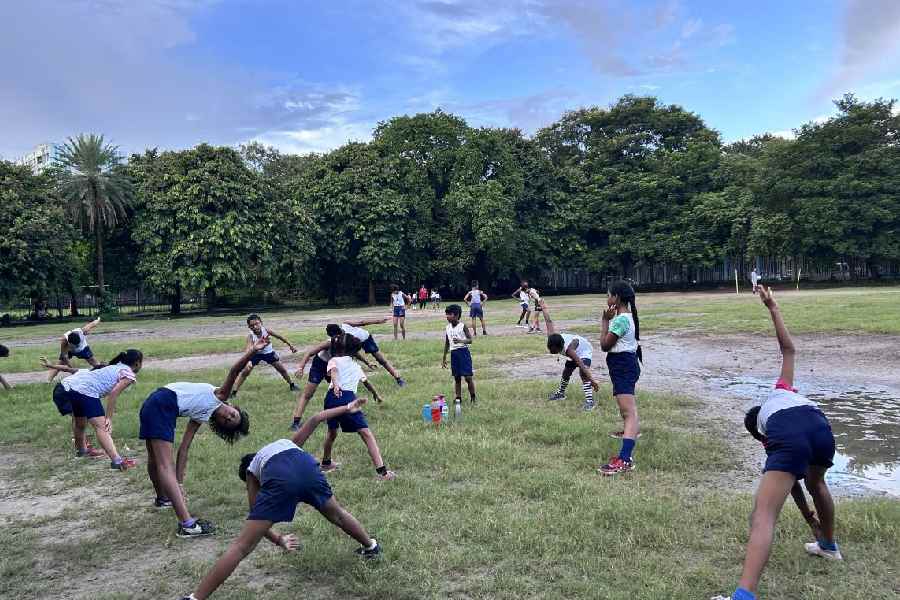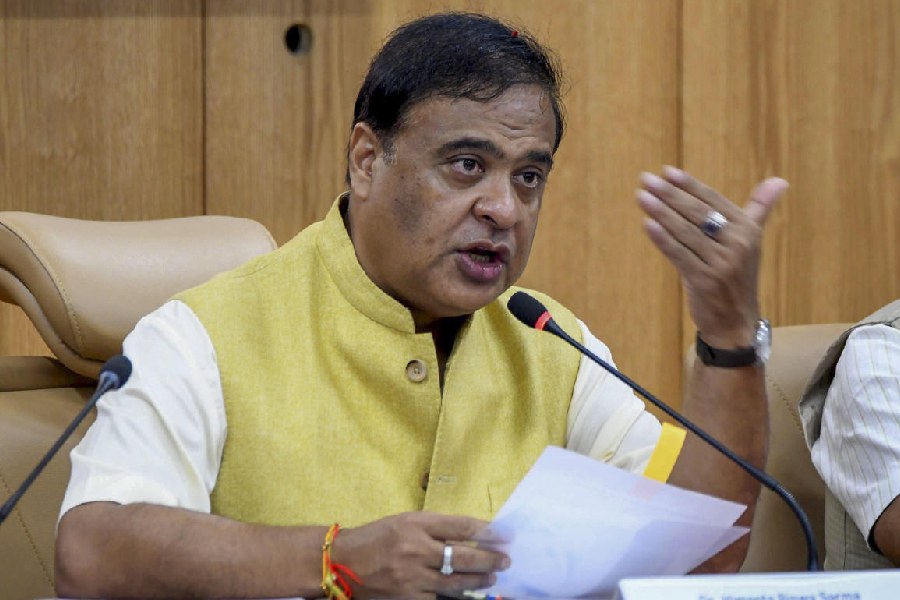Coach Dipu Das keeps count as children in white and blue jerseys jump up and down — onetwothree, onetwothree… It is camp day. They are warming up before PT.
At 4pm on a weekday, should you be around the Lakes in south Calcutta, you will hear the sound of boots on soft ground, thud, thud, thudding. If you were a bird, you would pause mid-flight, just to stare at the bobbing red, blue, green, orange and white forms. Children of all ages, from four to 14, perhaps even older, come all the way from Champahati, Bata, Nangi, Sonarpur, Jaynagar, Piali, just to play.
The younger children are accompanied by their parents, mostly mothers.
Pratibha Naskar has come from Budge Budge with her son Biprakash, a student of Class VII. She says, “I would have liked to skip today because of the weather, but he would not have it.”
The White Borders ground, which is the area skirting the Rabindra Sarobar Stadium, is divided into sections. There is one for footballers, one for athletics and one big chunk serves as cricket pitch. Should you walk down along Southern Avenue towards Kalighat, to your left are clubhouses with names like White Borders Association, Southern Sports Association, Pankaj Gupta Memorial Sports Club.
Children in white uniform with the emblazoned letters S. A. C., short for Southern Athletic Club, queue up. Coach Das is doing the roll call — “Biman Pramanik, Swapnaneel Sadhukhan, Shreya Samanta, Sreyoshi Naskar, Saqib, Anik Shau, Priyanshu Bera…” The little ones jump on their toes to be seen. The older ones are more contained. One of the older girls asks a boy, “How much did the football club pay you last Sunday?” The boy holds up two fingers. She asks, “Two thousand?” The boy replies, “I wish.”
A group of younger boys kick up dirt and swing from poles on the edge of the green expanse. The coach’s whistle pierces the air. The group disperses with a flurry of movements and laughter.
The younger ones, aged between five and eight, form a human chain and run behind Coach Rekha Halder. The older children are more free-spirited. They deliberately step into the puddles, break into frog jumps. Coach Das drags his left boot on the ground to draw a straight line. The girls have to hop across it, 20 counts. He blows a warning whistle every time someone misses a step.
Coach Halder says, “Many children come to us when they are only four or five years old. Just like school, some children cry for their mothers, while some children are frenetic with excitement.” Surrounding her are about 17 boys. They are practising the long jump with utmost concentration. After each jump, they look up at their coach for approval. Eight-year-olds Souvik Sammadar and Swapnajit Sarkar take the lead. Halder adds, “It’s on me to ensure that these children enjoy their time here.”
Aniruddha Mondal, 9, says, “I come here because I love playing.” His mother Lakshmi cheers him on as he runs with the other children. She says, “I was a runner and part of an athletics club. I had to give up because of my family after I got married. But I want my sons to train and practise. I have a four-year-old. Next year, he will join his brother.”
The older boys warm up with push-ups and high-knee jumps. Then they run longer tracks around the entire field. Mothers spread sheets of newspapers on the floor outside the clubhouses and watch their children play. Pinky Laskar has come from Champahati with her daughter Suhani Laskar. She says, “More people get jobs from sports and athletics these days. So I think this is equally important.” Suhani, 17, is a national-level runner.
Dipali Naskar says, “My son Deb wants to join the army. Training in athletics will prepare him for that.” The parents tell stories of former students who have found employment with the army or the railways, or the state government, after qualifying at the national level of some sport.
The mothers have their own reasons, but the children play for the sake of it. One of the senior coaches Amal Ghosh says, “I grew up playing in this stadium since 1968.” Ghosh, who is a former national record-holder in the long jump, is also a retired railway employee. He says, “Alongside my job, I have been a coach here since 1982. I am retired now, but I love the children and sports, so I make it a point to show up.”
On weekends, the evenings are more festive, and more children are present. Coach Das says, “Children come in from as far as Nadia, Burdwan, Midnapore. If someone shows potential, we ask them to come for practice in the mornings, too. You never know how far these children will go… the sky’s the limit.”










